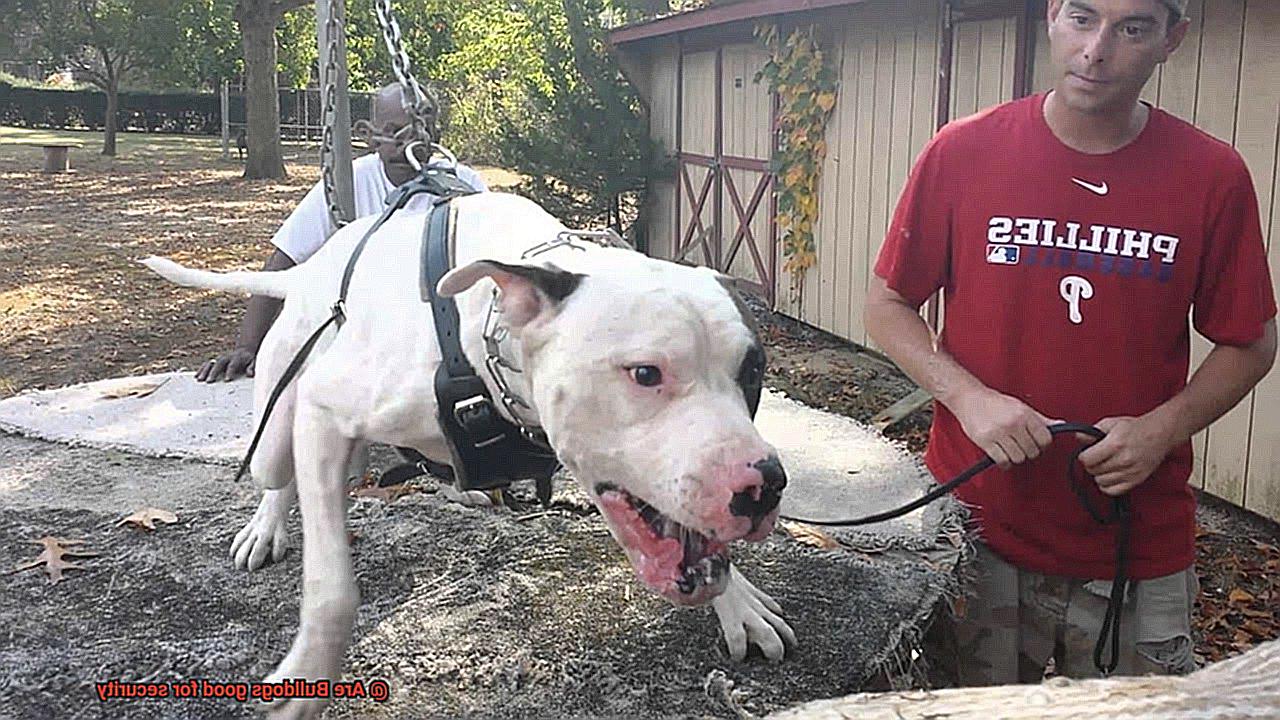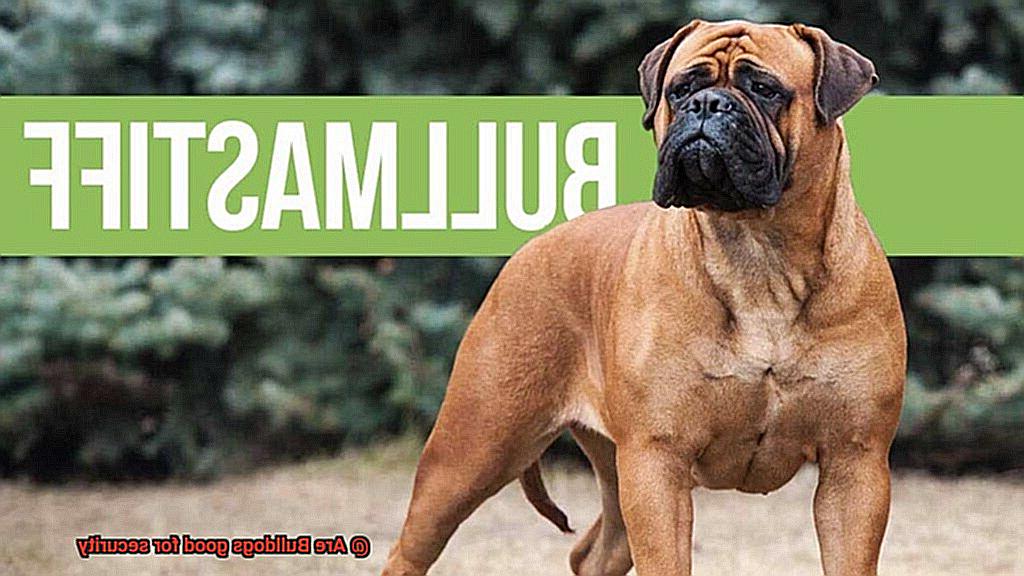Are Bulldogs good for security?
Picture this: a home security system that’s not only effective but also irresistibly adorable. That’s right, we’re talking about Bulldogs. These wrinkled wonders are known for their friendly nature and unwavering loyalty, but can they really hold their own when it comes to protecting your castle? In this blog post, we’re diving deep into the world of Bulldogs as security dogs.
So, whether you’re a Bulldog fanatic or simply on the hunt for a reliable home guardian, join us as we explore whether these lovable pups have what it takes to be top-notch protectors. Get ready to discover the unique qualities that make Bulldogs potentially good security dogs and find out if their reputation matches the reality.
It’s time to unleash the truth and make an informed decision about your furry security squad.
The Pros and Cons of Bulldogs as Security Dogs
Contents
- 1 The Pros and Cons of Bulldogs as Security Dogs
- 2 Bulldog Temperament: A Closer Look
- 3 Physical Limitations of Bulldogs as Security Dogs
- 4 Aggression and Alertness in Bulldogs
- 5 Stamina and Endurance: An Important Consideration
- 6 Barking Ability: A Useful Tool for Security Purposes?
- 7 Other Breeds Better Suited for Security Work
- 8 Training a Bulldog to be a Guard Dog
- 9 Conclusion
When it comes to security dogs, Bulldogs may not be the first breed that comes to mind. Known for their friendly and gentle nature, Bulldogs are more commonly seen as family pets rather than guard dogs. However, there are certain advantages and disadvantages to using Bulldogs as security dogs. Let’s take a closer look.
Pros of Bulldogs as Security Dogs:
- Intimidating Appearance: Bulldogs have a strong and muscular build, with a wide-set jaw that can give them a menacing look. This alone can act as a deterrent to potential intruders, making them think twice before attempting to break in.
- Loyalty and Protective Nature: Bulldogs are known for their loyalty and protective instincts towards their families. They form strong bonds with their owners and will go to great lengths to keep them safe. This natural instinct can make them effective as security dogs, as they will fiercely defend their territory and loved ones.
- Friendly and Gentle Temperament: Despite their intimidating appearance, Bulldogs are generally friendly and gentle dogs. They are known for being good with children and other pets, creating a harmonious environment while still providing a level of protection.
- Focus and Awareness: Bulldogs are not typically high-energy or overly athletic. This can work in their favor as security dogs, as they are less likely to be distracted by external stimuli or engage in unnecessary chasing or barking. Their focus and heightened sense of hearing make them an effective early warning system for potential dangers.
Cons of Bulldogs as Security Dogs:
- Lack of Agility and Speed: Bulldogs are not known for their agility or speed. This can limit their ability to physically apprehend an intruder or chase after them if they manage to escape.
- Training and Socialization Requirements: Bulldogs require consistent training and socialization to be effective in a security role. Without proper training, they may become overly aggressive or exhibit unwanted behaviors.
- Brachycephalic Breeds: Bulldogs have a short muzzle and compromised respiratory system, making them prone to heat exhaustion and breathing difficulties. This can limit their ability to perform certain security tasks, especially in hot climates.
- Shorter Lifespan: Bulldogs have a relatively short lifespan compared to other breeds, usually ranging from 8 to 10 years. This shorter lifespan should be considered when evaluating the long-term commitment and investment required for a security dog.
In conclusion, while Bulldogs may not excel in traditional security roles, they can still play a valuable role in alerting their owners to potential threats through their barking. However, it is important to choose a breed that is specifically bred and trained for security purposes when considering a security dog. Consulting with a professional dog trainer or behaviorist can help determine if a Bulldog is a good fit for security duties.
Bulldog Temperament: A Closer Look
Today, we’re going to dive deep into the world of Bulldog temperament and explore what makes these lovable pups tick. While Bulldogs may not be the first breed that comes to mind when thinking about security dogs, they do possess certain qualities that make them suitable for this role to some extent. So, let’s take a closer look at the factors that influence a Bulldog’s temperament and see if they have what it takes to be your loyal protector.
- Protective Instincts: Bulldogs are known for their protective nature. While they may not be aggressive by nature, they are fiercely loyal to their families and will go to great lengths to defend them and their territory. This protective instinct makes Bulldogs excellent watchdogs, as they will alert you to any potential threats with their deep and resonant bark.
- Calm and Composed: Unlike some breeds that can be impulsive or easily agitated, Bulldogs have a calm and composed demeanor. This makes them well-suited for security purposes, as they are less likely to act out without reason. Their even-tempered nature means you won’t have to worry about them getting carried away or escalating a situation unnecessarily.
- Physical Presence: Bulldogs may not be the most athletic or agile dogs out there, but their strong physical presence and robust build can still make them formidable to intruders. Their muscular bodies and intimidating appearance alone can serve as a deterrent, making potential wrongdoers think twice before crossing your path.
- Good with Children and Animals: One of the great things about Bulldogs is that they are generally good with children and other animals. This is an important consideration for families who want a security dog that can also be a loving companion. With a Bulldog by your side, you can rest easy knowing that they will protect your little ones just as fiercely as they protect you.
- Training and Socialization: Just like with any dog, proper training and socialization are key factors in shaping a Bulldog’s temperament. Early exposure to various people, situations, and environments will help ensure that they develop into confident and well-adjusted dogs. Training them to bark loudly on command can also be a useful security tool, as their deep, resonant bark is sure to send chills down the spine of any intruder.

Of course, it’s important to remember that individual temperament can vary among Bulldogs, so it’s crucial to assess each dog’s personality and behavior before determining their suitability for security purposes. Additionally, Bulldogs do have some limitations that should be considered – their lack of athleticism and agility may limit their effectiveness in certain security situations that require quick movements or chasing down intruders.
Physical Limitations of Bulldogs as Security Dogs
Bulldogs are well-known for their muscular build and strong appearance, which may lead some to believe they would make excellent security dogs. However, it is important to consider their physical limitations when evaluating their suitability for this role. In this blog post, we will explore the physical constraints that make Bulldogs less suitable for security work.
Brachycephalic Structure:
Bulldogs’ distinctive short-muzzled structure, known as brachycephalic, can lead to respiratory issues. This characteristic makes Bulldogs more prone to overheating and exhaustion, hindering their ability to engage in physically demanding tasks required for security work. Prolonged running or chasing down suspects can be challenging for Bulldogs due to their compromised breathing.
Fatigue and Stamina:
Due to their compact and heavy body structure, Bulldogs have a tendency to become easily fatigued. Their short legs and low stamina make it difficult for them to maintain high energy levels required for rigorous training sessions or extended periods of alertness – both of which are essential for effective security dogs.
Restricted Mobility and Agility:
Bulldogs’ stocky and relatively inflexible body limits their mobility and agility. They face difficulty navigating through tight spaces or climbing obstacles, which can hinder their ability to patrol areas effectively or access hard-to-reach locations often encountered in security scenarios.
Reduced Speed:
Compared to other breeds commonly used as security dogs, Bulldogs are not known for their exceptional speed. Their short legs and heavy build make them relatively slow, limiting their ability to quickly respond to threats or apprehend intruders. This compromises the overall effectiveness of Bulldogs in a security role.
Non-Aggressive Nature:
It is worth noting that Bulldogs have a friendly and non-confrontational nature. While this makes them wonderful companions, it may make them less suitable for aggressive security tasks. Bulldogs are not naturally predisposed to exhibit protective behaviors or aggression towards strangers, which is a crucial aspect of security work.
Aggression and Alertness in Bulldogs
French Bulldogs are known for their friendly and docile nature, but don’t let their loveable demeanor fool you. With the right socialization and training, these gentle giants can become alert and protective watchdogs. In this blog post, we’ll explore how socialization and training are essential for Bulldogs to achieve the perfect balance of aggression and alertness.
The Importance of Socialization:
Socialization plays a critical role in shaping a Bulldog’s behavior and temperament. By introducing your Bulldog to various people, animals, and environments from a young age, you can help them develop confidence and adaptability. This will prevent them from becoming overly fearful or aggressive in unfamiliar situations.
Training for Alertness:
Bulldogs have excellent senses, making them naturally alert watchdogs. However, it’s important to channel this alertness through training. Teach your Bulldog commands like “watch” or “alert” to focus their attention on potential threats while avoiding unnecessary aggression. Reward them for exhibiting appropriate alert behaviors, such as barking or standing guard.
Setting Boundaries:
Bulldogs are friendly dogs who may be easily swayed by attention or treats from strangers. Establish clear boundaries with your Bulldog to ensure their focus remains on protecting your home and family. Train them to differentiate between friendly visitors and potential threats through positive reinforcement techniques.
Building Confidence:
Confidence is key when it comes to effective protection. Engage your Bulldog in activities that boost their confidence, such as agility training or obedience competitions. This will not only improve their physical fitness but also enhance their problem-solving skills and decision-making abilities.
Ongoing Training and Reinforcement:
Training should be an ongoing process throughout your Bulldog’s life. Regular practice sessions will help reinforce desired behaviors and maintain their alertness. Consistency and positive reinforcement are crucial for long-term success.
Stamina and Endurance: An Important Consideration
French Bulldogs are known for their adorable appearance and affectionate nature. While they may not be the first breed that comes to mind when thinking about security dogs, they can still serve as effective guardians in certain situations. However, it’s important to consider their stamina and endurance limitations before expecting them to excel in activities that require sustained physical exertion.
French Bulldogs’ Physical Limitations:
- Short snouts and compact bodies: These characteristics make it difficult for French Bulldogs to engage in vigorous physical activity for extended periods.
- Brachycephalic nature: Their shortened skull shape can lead to breathing difficulties and overheating during exercise.
- Low energy levels: French Bulldogs have a tendency to become easily fatigued, making them better suited for short bursts of activity rather than long-distance endurance tasks.
Excel as Watchdogs:
- Strong protective instinct: French Bulldogs have a natural inclination to protect their homes and loved ones.
- Loyalty and territorial nature: They are known for their loyalty and will go to great lengths to guard their territory.
- Deep bark: French Bulldogs possess a deep, powerful bark that can deter potential intruders and alert their owners to any suspicious activity.
- Intimidating appearance: Their muscular build and imposing presence can serve as a deterrent to would-be trespassers.
- Keen senses: French Bulldogs have sharp senses and are highly vigilant in guarding their territory, detecting unusual sounds or smells.
Barking Ability: A Useful Tool for Security Purposes?
When it comes to security dogs, French Bulldogs may not be the first breed that comes to mind. With their friendly and calm temperament, they are more commonly known as companion animals rather than guard dogs. However, don’t let their adorable appearance fool you – French Bulldogs can still be effective in certain security situations. In this blog post, we will explore how these pint-sized protectors can serve as a valuable tool for security purposes.
Intimidating Appearance:
French Bulldogs may not have the reputation of being fierce guard dogs, but their physical presence alone can act as a deterrent. With their sturdy build and muscular stature, they are often seen as a formidable breed. Burglars are less likely to target a property that has a French Bulldog on watch.
Protective Nature:
While French Bulldogs may not bark as much as other breeds, their loyalty and protective instincts make them instinctively inclined to protect their family and territory. They may not rely solely on barking for security purposes, but their alertness and vigilance can still play a crucial role in detecting potential threats or strangers approaching the property.
Deep and Loud Bark:
When French Bulldogs do decide to use their voice, it can be deep and loud, catching intruders off guard. Their bark may not be as frequent as other breeds, but it can still be enough to startle or deter potential intruders. Combined with their intimidating appearance, this bark can send shivers down the spines of trespassers.
Keen Senses:
French Bulldogs have sharp senses, including acute hearing and a strong sense of smell. These abilities allow them to detect unusual sounds or smells that may indicate an intruder or danger nearby. Their alertness serves as an additional layer of security for your home.
Training and Socialization:
It is important to note that French Bulldogs should undergo proper training and socialization to ensure their behavior is well-rounded and appropriate in various situations. While they have protective instincts, they may not possess the same level of aggression or natural guarding instincts as breeds specifically bred for security purposes.
Other Breeds Better Suited for Security Work
When it comes to security work, French Bulldogs may not be the first breed that comes to mind. While they may have their own unique qualities and charm, there are other breeds that are better suited for this specific task. As an expert in the field of security dogs, I have seen firsthand the advantages that certain breeds have over others when it comes to security work. Let’s take a closer look at some of these breeds.
- German Shepherds: Known for their intelligence, loyalty, and protective nature, German Shepherds are one of the top choices for security work. They have a strong work drive and can be easily trained to guard property or work alongside law enforcement.
- Belgian Malinois: Highly intelligent and agile, Belgian Malinois excel in security work. They are often used in military and police roles due to their ability to detect threats and their high energy levels.
- Rottweilers: With their protective nature and imposing presence, Rottweilers make excellent guard dogs. They are large and powerful, capable of intimidating intruders with their mere presence.
- Doberman Pinschers: Highly trainable and intelligent, Doberman Pinschers have a natural instinct to protect. They are loyal to their owners and can be trained to respond to various commands and situations.
- Boxers: While not as commonly associated with security work, Boxers possess many qualities that make them suitable for the task. They are strong, alert, and protective by nature.
It is important to note that while these breeds may be better suited for security work, individual temperament, training, and socialization play a significant role in determining a dog’s suitability for the task. French Bulldogs may not have the same physical attributes or instincts as these breeds, but with the right training and socialization, they can still be effective in deterring potential threats and providing a sense of security.
Training a Bulldog to be a Guard Dog
French Bulldogs may not be the first breed that comes to mind when thinking about guard dogs, but with the right training and socialization, they can provide a sense of security like tiny but mighty alarm systems. In this comprehensive guide, we will explore the steps to train your French Bulldog to be a guard dog, emphasizing their protective nature and loyalty.
Start Early and Establish Good Habits:
Begin training your French Bulldog as early as possible to establish good habits and build a strong bond between you and your furry companion. Consistency and patience are key during this process, as it may take time for them to fully grasp and execute the required skills.
Basic Obedience Training:
Before diving into specific guard dog training, ensure your French Bulldog has mastered basic obedience commands such as sit, stay, come, and heel. These commands form the foundation for more advanced training.
Socialization is Key:
Socialize your French Bulldog with other dogs and people to ensure they remain friendly and well-behaved in different environments. This will help prevent aggression towards strangers and create a confident dog who can discern between normal visitors and potential threats.
Desensitization Training:
Gradually expose your French Bulldog to various stimuli, including loud noises, unfamiliar objects, and different locations. This desensitization process will help prepare them for potential security situations where they need to remain calm and focused.
Teaching the Bark Command:
Teaching your French Bulldog to bark on command can be useful for alerting you to potential threats or intruders. Use positive reinforcement techniques such as treats and praise when they successfully follow the command.
Consider Professional Training:
Enroll your French Bulldog in professional guard dog training classes or work with an experienced trainer who specializes in this field. They can provide expert guidance on advanced obedience training, bite work, and defensive tactics.
Evaluate Individual Characteristics:
It’s important to remember that not all French Bulldogs will have the same aptitude or temperament for guard dog work. Evaluate your dog’s individual characteristics and abilities before investing significant time and effort into training them for this role.
XiRC37EF9kY” >
Conclusion
In conclusion, Bulldogs can indeed be good for security.
Their strong and muscular build, combined with their fearless nature, make them an imposing presence that can deter potential intruders. With their keen sense of hearing and alertness, Bulldogs are quick to detect any unusual sounds or movements around the house.
They are also fiercely loyal and protective of their families, making them willing to defend their loved ones if necessary. Despite their friendly and affectionate nature, Bulldogs have a natural instinct to protect their territory and will not hesitate to confront any perceived threats.
While they may not possess the same level of aggression as some other guard dog breeds, Bulldogs’ physical strength and unwavering loyalty make them a reliable choice for home security.




